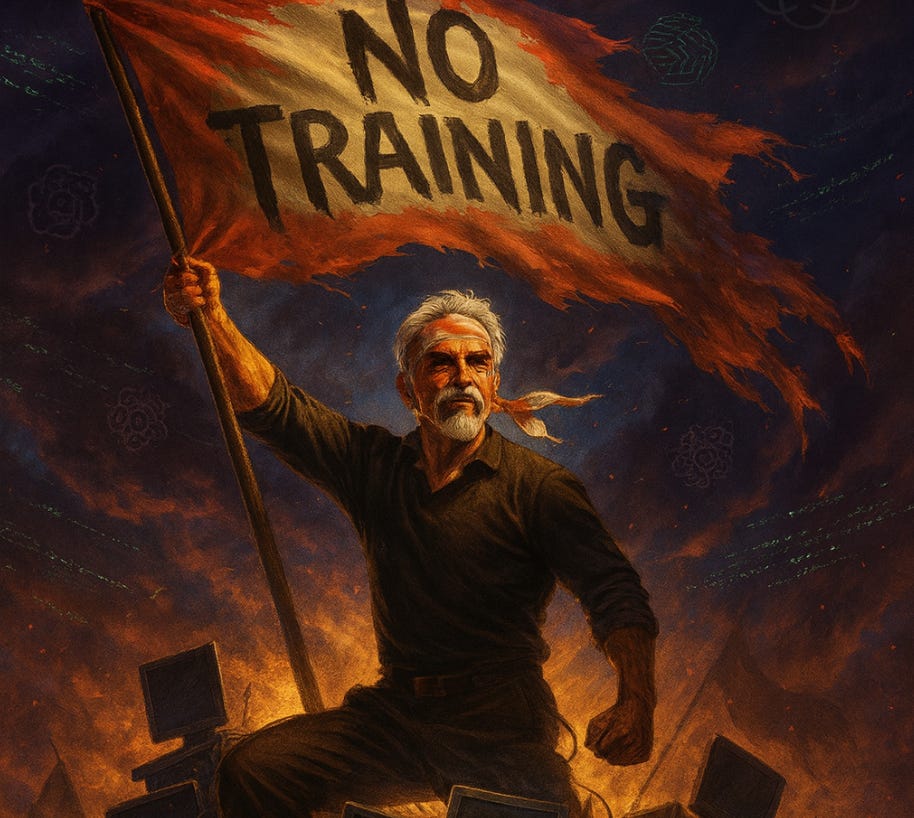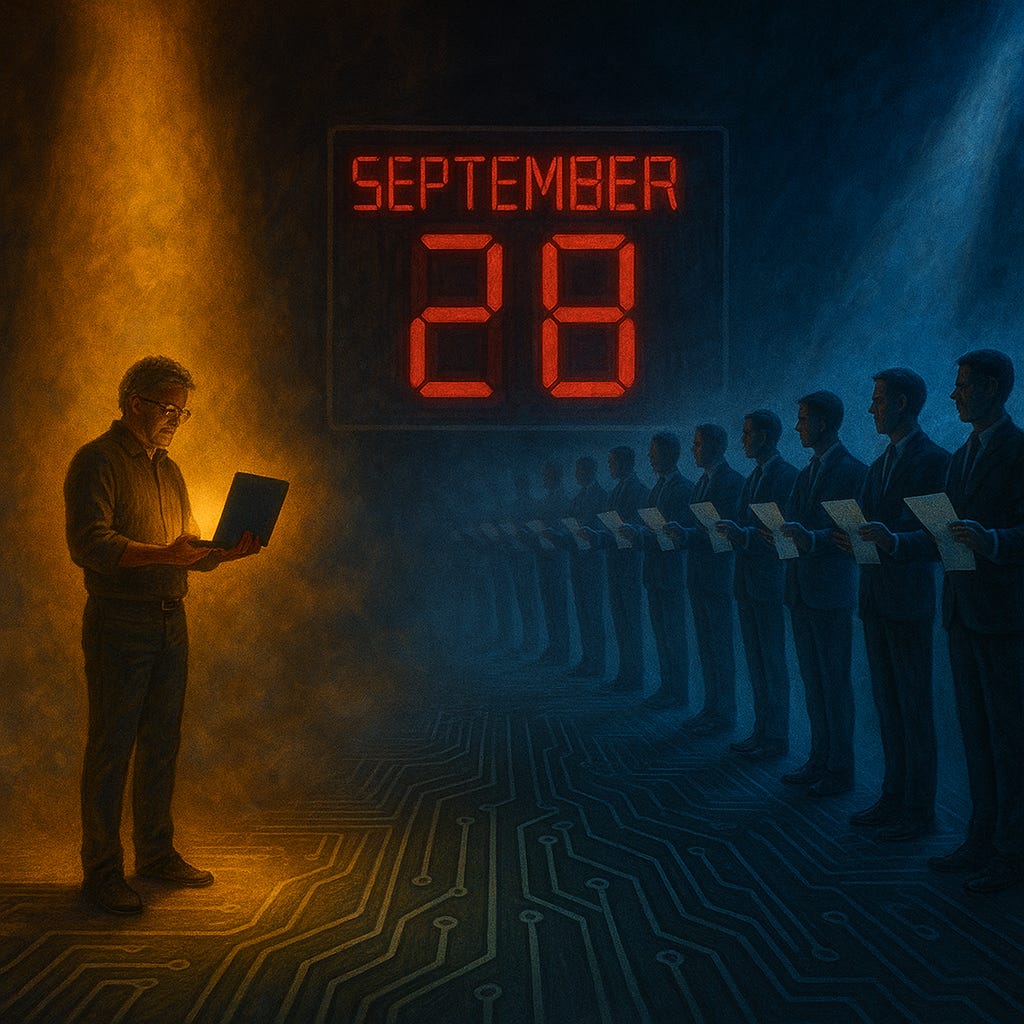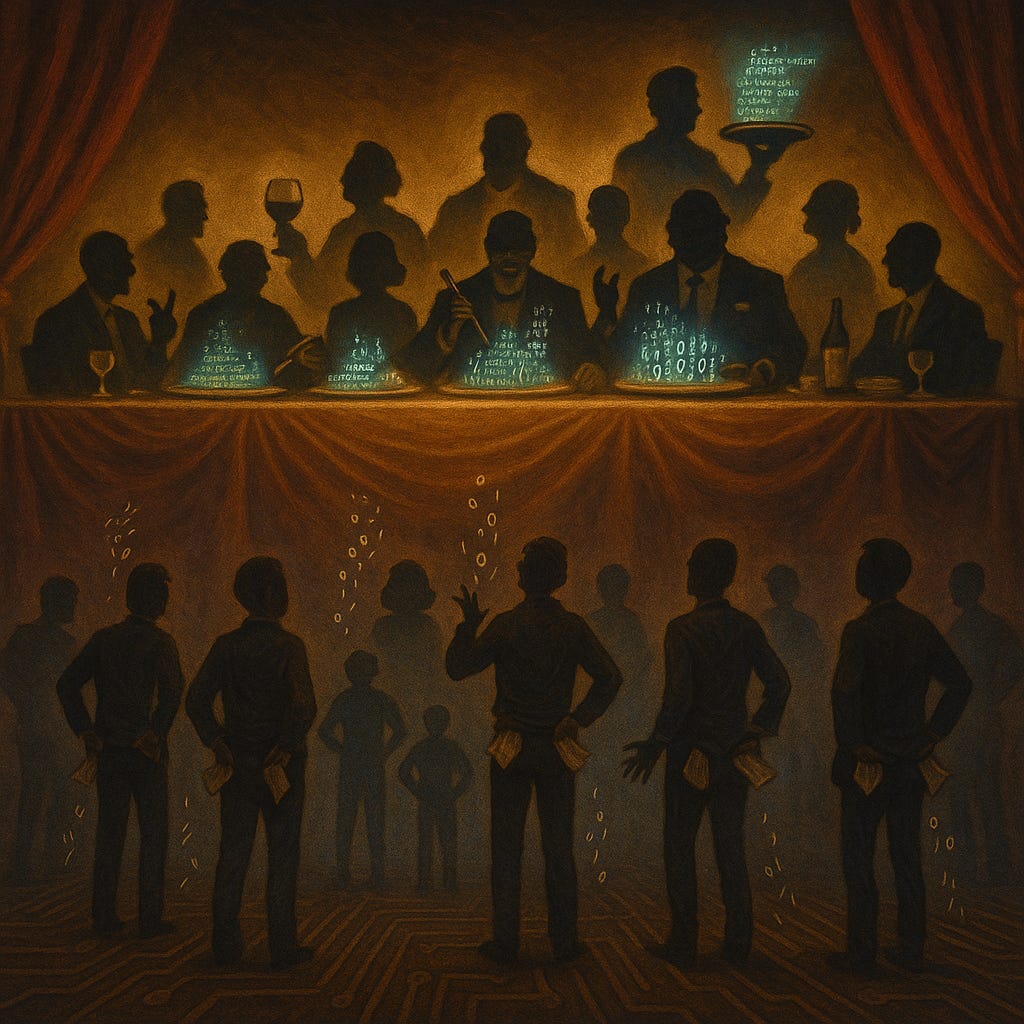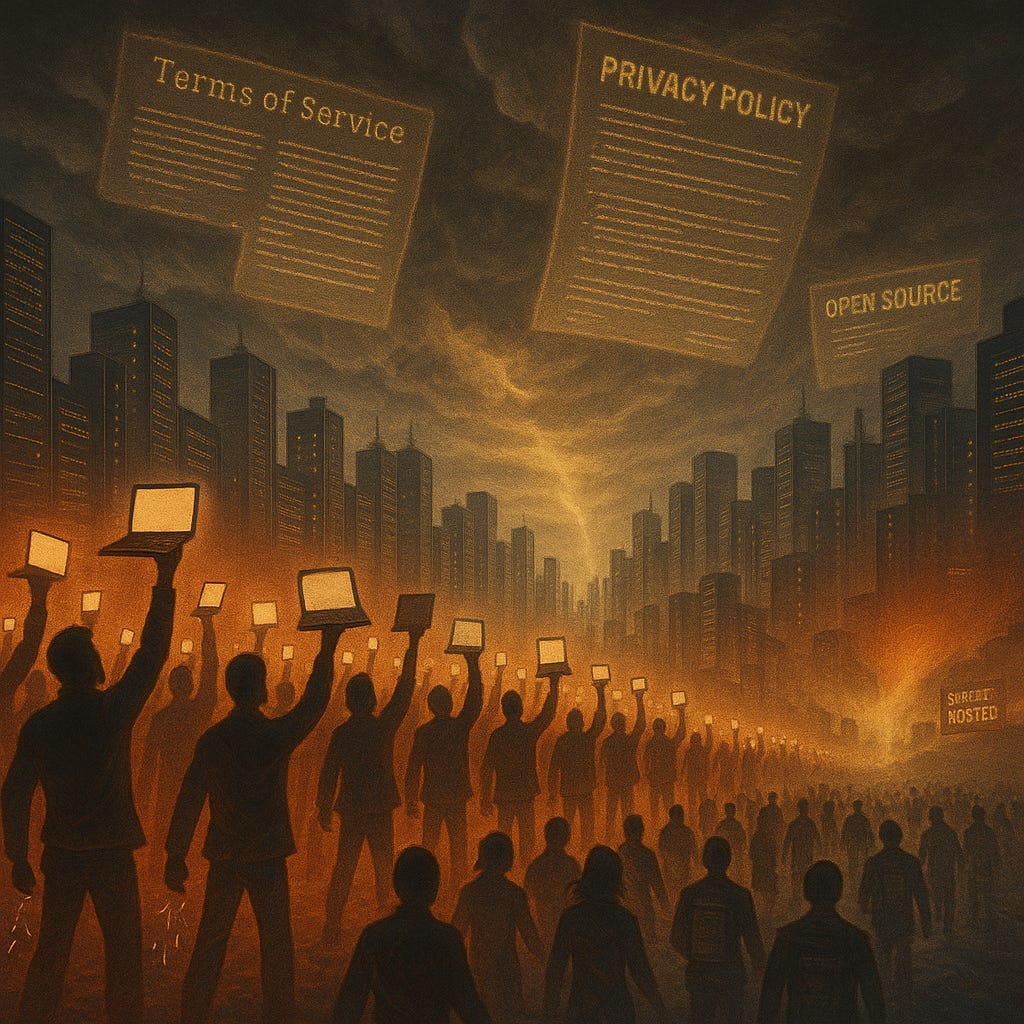Anthropic Planning To Train AI On Your Prompts
Their Data Policy Shift and What It Means for Agentic Development
Anthropic changed the rules Wednesday. September 28, existing users pick: let them train on your chats or opt out. New users? You're already in—they're training on everything unless you scramble through settings menus at 10 PM wondering where the hell that toggle went.
Here's what gets me. They built Clio—this privacy-preserving analysis system that supposedly understands usage patterns without reading individual chats. Impressive tech. Really impressive. Then they turn around and demand five years of raw conversation retention anyway?
That doesn't add up.
Spent three days reading every major AI provider's data policies—Anthropic's Consumer Terms, OpenAI's Privacy Policy, Google's Gemini Terms, Meta's AI Service Terms, Mistral's Privacy Policy, plus the Chinese providers' documentation. My eyes still hurt from the legalese. The patterns? Obvious. Depressing. And about to cost developers way more than they realize.
Your Code Trains Their Models Now
New users starting immediately. Everyone else by September 28. Anthropic keeps your Claude conversations for five years. Not the old 30 days.
Five. Years.
Including those 2 AM Claude Code sessions where you're debugging the proprietary algorithm your startup depends on. That conversation where you explained your entire security architecture. The one where you fixed that vulnerability before the patch went public.
Didn't opt out? Training data.
The implementation pisses me off. Big black "Accept" button staring at you. Tiny toggle below—the one controlling whether they train on your data—already flipped to "On." Smaller font. Lighter color. Clear dark pattern tactic.
Google? Same playbook. September 2, Gemini starts eating consumer data by default. OpenAI's been doing this forever. The entire industry decided consumer privacy died somewhere between GPT-3 and GPT-4.
Who's Eating Your Data: A Field Guide
Built this comparison at 3 AM last night. Coffee number four. Here's the landscape:
The Hungry Ones (Opt-Out Default)
Anthropic: Five-year data buffet unless you opt out. Consumer accounts only. Enterprise customers get actual privacy
OpenAI: ChatGPT Free/Plus/Pro becomes training data. Team and Enterprise stay protected. Shocking
Google: Gemini gobbles everything by default. Your uploads too, starting September 2025
Meta AI: Can you opt out? Spent 20 minutes looking. Couldn't find it. They share with "affiliates" which means whoever they want
The Less Starving
Mistral: Le Chat Pro (€14.99/month) doesn't train on inputs. Free tier does. Honest about it at least
xAI (Grok): Opt-out exists. Two clicks in account settings. Actual respect for users
The "Hell No" Tier
DeepSeek: Everything stored in mainland China. No deletion timeline. No opt-out. Your code becomes state property
Qwen/Baidu: Chinese jurisdiction. National Intelligence Law means the government gets everything. Period
Clear pattern. Western companies pretend you have a choice—just make opting out annoying enough that most users won't bother. Chinese companies don't pretend at all.
Clio: When Smart Tech Meets Dumb Decisions
Clio fascinates me. Also infuriates me. Here's why.
The tech:
Extracts metadata from conversations (supposedly no personal details)
Groups similar interactions
Creates pattern summaries without exposing individual chats
Shows trend analysis to Anthropic staff
Brilliant, right?
They discovered coding tasks dominate at 10.7% of usage. Web and mobile development specifically. Japanese users discuss elder care 3.2x more than baseline. They caught coordinated spam invisible at the conversation level. All without supposedly reading your actual chats.
So riddle me this.
If Clio can extract these insights while "preserving privacy," why extend retention from 30 days to 1,825 days? Why demand raw conversation access when your fancy system supposedly doesn't need it?
Here's my theory after reading their research paper twice. Clio handles the PR story—"look, we respect privacy!"—while the real training happens on those five-year archives. They want aggregate insights AND raw training data. Classic cake-having and cake-eating.
Right now, they're signaling they want both.
Legal Pressure's Boiling Over
Three things happened. Timing's not coincidental.
Thing One: The New York Times sued OpenAI. Judge ordered OpenAI to keep ALL ChatGPT conversations forever. Including deleted ones. Brad Lightcap called this "a sweeping and unnecessary demand that conflicts with privacy commitments." No kidding, Brad.
Thing Two: Europe's swinging hammers. Italy fined OpenAI €15 million for GDPR violations. Then banned DeepSeek after getting "totally insufficient" answers about data handling. More bans coming. Anthropic probably sweating through their hoodies watching this.
Thing Three: Academic bombs dropped. Recent research from MIT and MDPI suggests AI tool usage correlates with significant comprehension drops when students work without assistance. One study found 60% worse comprehension, another documented 75% reduction in problem-solving ability. The exact methodologies vary, but the pattern's consistent. Better train those models faster before everyone realizes the productivity gains are mirages.
What This Actually Means (For Real Developers)
Kiss Your Proprietary Code Goodbye
Every debugging session? Training data.
That algorithm you spent three weeks perfecting at 4 AM
Client code covered by $2M NDAs
Internal authentication systems
Security implementations (yeah, those especially)
Bug fixes revealing your entire architecture
Database schemas you'd rather competitors not see
In 2030, your competitor asks Claude for implementation help. Guess whose code helped train that answer? Yours. From today. You're welcome, random startup that'll eat your lunch.
Privacy Costs Extra (Surprise!)
Every provider built identical fences:
Anthropic: Claude for Work—privacy for $200+/user/month
OpenAI: ChatGPT Enterprise—same deal, different logo
Google: Workspace editions protected, consumer Gemini isn't
Mistral: La Plateforme API with actual data agreements
Translation: Privacy costs 10x what features cost. Nice racket.
Behavior's Already Shifting
Watch your team Slack. Developers stopped sharing sensitive snippets last week. Architecture discussions moved to whiteboards. The really innovative stuff? Happens in person now. Or on Signal. Or nowhere.
Creates this bizarre loop.
AI tools train on increasingly boring code. The cutting-edge work that'd actually improve them? Happens offline. Models get better at explaining print("Hello World") while missing everything interesting.
Self-defeating. Predictable. Happening right now.
Mistral: The French Exception
Every privacy comparison I run, Mistral wins. French company. EU laws. Models you can actually self-host.
What they deliver:
Mixtral matches GPT-4 performance (beats it on several benchmarks)
Run on YOUR hardware if paranoid (or smart)
Published architecture anyone can verify
Le Chat Pro: €14.99/month, zero training on your data
Incogni ranked Le Chat #1 for privacy. Beat ChatGPT. Beat Claude. Beat everyone.
European companies find this compelling—though the trade-offs include slower feature iteration and less aggressive marketing push. For anyone actually handling truly sensitive IP? One of the few legitimate options left.
For the rest of us? Nice to know it exists. Not switching anytime soon.
So What Do You Actually Do?
The Pragmatic Developer's Take
Look, I'll be honest. I'm not self-hosting anything soon. Don't have the time, don't have the patience. My code? It's clever sometimes, but it's not original. I'm building products, not inventing new algorithms.
Before September 28:
Read the actual terms (took me 20 minutes)
Decide if you care enough to opt out
If you handle client data, definitely opt out
Screenshot anything actually sensitive
Move on with your life
My approach:
Client data? Yeah, enterprise accounts. That's just professional
My own projects? Whatever, I'll probably keep using consumer tier
Actually novel algorithms? Those barely exist in my work
Security work? OK that stays offline, I'm not stupid
Reality check: Most of us write CRUD apps with fancy UIs. If Claude learns from my React components and Express routes, so what? Half of it came from Stack Overflow anyway.
For Companies (Be Reasonable)
Actually Important:
Customer data needs enterprise accounts (legal requirement)
Security implementations stay offline (common sense)
Unreleased features... honestly depends how competitive your market is
Probably Overkill:
Banning all consumer AI use
Self-hosting everything
Air-gapped development environments
Treating every line of code like it's the formula for Coca-Cola
Most companies should just get enterprise accounts for production work and call it a day. The paranoia costs more in productivity than you'd lose from theoretical code leakage.
Open Source Maintainers
Your code's already public. Your commit history tells your story. If someone wants to copy you, they don't need your Claude conversations. Focus on shipping.
The Long Game's Broken
Innovation Slows, Not Dies
Here's the reality. AI companies need quality data. Smart developers realize they're giving away something for $20/month convenience. Some stop sharing innovative work. Models train on increasingly basic examples—the quality of training data will suffer, relying on simple tutorials instead of novel solutions.
But honestly? Most of us aren't that innovative anyway. We're building variations on solved problems. If my CRUD app patterns help train GPT-5, I'm not losing sleep.
Watched this happen. Our best developer moved everything offline last month. Junior devs still dump everything into Claude. Guess whose code trains GPT-5?
Two Tiers, No Justice
Free tier: They get everything—unless you pay Enterprise: Pay up for basic human rights
Screws over:
Indie developers building the next thing
Startups without $50K for enterprise licenses
Academic researchers developing breakthroughs
Anyone who believed "democratizing AI" meant something
Geographic Reality
DeepSeek impresses technically. Seriously impressive. But your data lives in China. Subject to laws making the Patriot Act look like a privacy love letter.
Western companies pretend privacy exists. Chinese models straight-up tell you: "The state owns your code." At least they're honest?
The Uncomfortable Data
Anthropic's Clio research accidentally revealed something hilarious. Sad. But hilarious.
Top Claude use? Debugging code and explaining Git commands.
Git. Commands.
This revolutionary AI system mostly explains basics to confused bootcamp grads. Meanwhile, actual innovation—breakthrough algorithms, architectural insights, competitive advantages—happens on whiteboards. In coffee shops. Anywhere except AI chatboxes.
Can't last.
Either AI companies figure out learning without theft, or they'll train on garbage while smart users disappear. Their call.
September 28: Pick Your Path (Or Don't)
Anthropic's deadline isn't really about their neural networks. It's about your relationship with AI tools going forward.
Three doors:
The Contributor: Accept it, move on, ship products
The Customer: Pay for enterprise if you handle client data
The Paranoid: Self-host everything, trust nothing
I'm mostly door #1 with a splash of #2 for client work. Mix of consumer tier (my own projects), enterprise agreements (client data), and basic common sense (security stays offline).
Yeah, it's more work tracking what goes where. But the convenience of consumer AI tools? Still worth it for most of what I do. My React components and API routes aren't that special.
Here's Where I Land
The industry wants you believing privacy and progress can't coexist. Mistral proves otherwise. Local models improve monthly. Open source communities ship alternatives daily. Quantized models now run on Raspberry Pi hardware.
But honestly? I'm not switching. Not yet.
We need AI assistance to ship products. And yeah, feeding these models our code feels weird when you think about it too hard. But most of what we write isn't that special. It's clever implementations of solved problems. If my authentication middleware helps train GPT-5, well... half of it came from documentation examples anyway.
September 28. Anthropic wants your decision.
Mine? I'll probably opt out of training just to be contrarian. But I'm still using Claude tomorrow. And the day after. Because I have products to ship, and the productivity gains are real—even if the privacy trade-offs suck.
Your mileage may vary. But let's be honest—most of us will click "Accept" and get back to work.
Just maybe read the terms first. Took me 20 minutes. Worth knowing what you're agreeing to, even if you agree anyway.







Good to know. And thanks for reading the fine print! Is there any downside to opting out? Except, of course, having to pay full price.